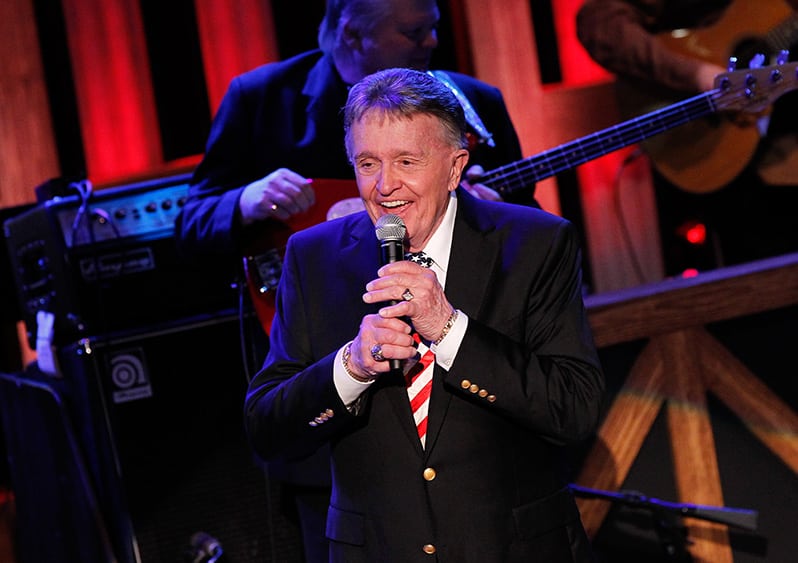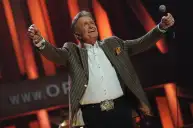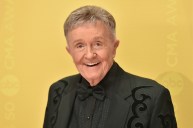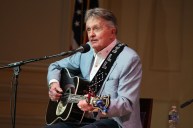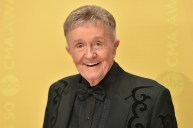South Carolina born and Georgia raised country music legend Bill Anderson has been writing and recording the soundtrack of the Grand Ole Opry for nearly 60 years. As a solo artist, "Whisperin' Bill's" classic '60s singles "Still," "Mama Sang a Song," "City Lights," "Po' Folks," "Wild Weekend" and "8x10" set a high standard for new his album Anderson, out Sept. 15. He's also one of Nashville's most consistent songwriters, penning hits for artists ranging from Ray Price and Connie Smith to Steve Wariner and Brad Paisley. This century alone, Anderson co-writes include Paisley and Alison Krauss' "Whiskey Lullaby" and George Strait's "Give It Away."
Videos by Wide Open Country
He's a well-rounded entertainer, as well, with past hosting gigs including the game shows The Better Sex (1977) and Fandango (1983-'89). A former journalist and radio personality, Anderson also thrived as the author of Whisperin' Bill Anderson: An Unprecedented Life in Country Music and I Hope You're Living as High on the Hog as the Pig You Turned Out to Be.
Anderson's creative range makes his new album a must-hear collaboration with Jamey Johnson, Erin Enderlin and other current songwriting talents. Standout tracks "Everybody Wants to be 21," "Waffle House Christmas" and "Old Things New" offer the sweet sentimentality Whisperin' Bill's fans crave, shared through digital-age means that change the meaning of what's at the "Tip of My Fingers."
The Country Music Hall of Fame, Nashville Songwriters Hall of Fame and Songwriters Hall of Fame inductee recently chatted with Wide Open Country about songwriting peers from throughout the decades and how the internet changed the music business.
WOC: When you first were writing songs in Nashville, the other songwriters there with you would've been people like Roger Miller, Willie Nelson and Mel Tillis. That's got to be one of the greatest groups of songwriters to go on and have solo careers. Did coming of age with those guys help you in any way? Did you have to up your game, being around that kind of talent?
Anderson: I'm sure it probably did, whether I realized it at the time or not. I mean, you could go on beyond the ones you named and mention Tom T. Hall and of course Loretta Lynn and Dolly Parton. There were so many. And Harlan Howard, of course. Harlan and I used to have a back-and-forth joke. He said every time I'd write a song that made the charts, it'd make him go home and write 10 songs. We were good friends. We were never competitors, but I inspired and challenged him. He and some of the others you mentioned certainly challenged and inspired me.
Friendly competition is a good thing in the creative world.
I think so. It was friendly competition, and it was a good thing. That was a very fertile period for country music right through there.
I know you went to the University of Georgia and studied journalism before starting your music career in Atlanta. Did having newspaper and radio experience help you in any way in music, be it through dealing with the media or promoting yourself?
Oh yeah, in a lot of different ways. You can't go to journalism school and learn how to write songs. They can't teach you that. But you can learn. I've come to realize in recent years that the thing they teach you in journalism school for writing a news story or whatever is to include the who, what, where, when, why and how. You'd better do that when you're writing a song, or people aren't going to understand what you're trying to say. There's some of those general principles.
With dealing with the media, my years as a disc jockey and being on that side of the microphone allowed me to understand what their issues are and what their problems are. When a disc jockey has to cut an interview short to go to commercial, I understand that. I know how radio stations get paid. So yeah, it was all part of the overall experience, and I wouldn't take anything for anything I've experienced.
With journalism, you're looking for those human interest elements that are going to touch the most people. As a country songwriter, you have a similar goal.
Absolutely. I tell people all the time that the greatest gift a songwriter can have, particularly a lyric writer, is empathy. To be able to put yourself in somebody else's place when you sing that song. Obviously you can't live every single song that you write, but somebody has probably lived it. When you come to understand that and go at it from that standpoint that maybe I'm not writing about my own emotions but I understand what someone else is going through... I think that's one of the greatest things you can have as a songwriter or any other kind of writer.
Fast-forwarding to the new album, it seems like you and Jamey Johnson have a solid working relationship. How did you meet him?
Buddy Cannon, a record producer here in town and a dear friend of mine, turned me on to Jamey. He kind of discovered Jamey before anybody else did here in Nashville. Jamey put out a local record in Alabama, and somehow Buddy got hold of it. He became an instant Jamey Johnson fan. He introduced me to Jamey, and the three of us started doing some things together. We ended up, of course, writing "Give It Away" together, which became Song of the Year in 2007. I've known Jamey a long time, and I consider him to be a dear friend. I was thrilled when he agreed to make this record with me with the song we wrote ("Everybody Wants to Be 21").
With him being considered an old-school country mind, would he have fit in during the time frame we talked about with you and Harlan Howard and Kris Kristofferson?
Oh gosh yeah. I think he would've loved to have lived in the '60s. He's an old soul, as we say.
You've also worked a good bit with Brad Paisley. What's he like? How did you meet him?
You know what Brad Paisley calls me, don't you?
What's that?
He calls me Moses. We were writing out of his house one night. Me, him and Jon Randall were writing a song. Jon Randall and Brad were sitting there with their computers and all of their fancy technology and their guitars pedals and all of this stuff. Brad looked at me, and I'm sitting over there with a number two pencil and a legal pad. Brad looked across at me and said, "Hey Moses, when did you stop writing with a hammer and chisel?" Brad and I, we have a fun relationship. We enjoy kind of digging at each other and carrying on a little bit like that, but he's a great guy and a wonderful talent. We've had a good bit of success together and a lot of fun together.
I guess I first met Brad... I may have met him, but if I did it didn't make an impression on me, up in Wheeling, West Va. before he came to Nashville, I played on the Wheeling Jamboree a lot, and of course Brad was in and out of there a lot. The first time I really remember sitting down with him face-to-face was when I hosted the Opry Backstage television show on TNN. He came on as a guest, I guess during his first Opry appearance. He had his first record out, and I took the time during the week listening to his album. I paid him some complements on-air, and I don't think he was prepared for that. We just became good friends with mutual respect.
I mentioned whether or not Jamey Johnson would've fit in in the '60s. I see Brad Paisley, with his sense of humor and personality, as someone who could've had a variety show back then, in that Glen Campbell spot.
He could have, and Brad Paisley and Roger Miller would've been good friends.
Because of their similar world views and personalities?
Well, just that quirky sense of humor that they both have. I think they would've challenged each other in a friendly sort of way.
You have a new song titled "Waffle House Christmas." Didn't Erin Enderlin co-write it?
She and Alex Kline came to me with the idea, and the opening line of the song just blew me away. "Mama burned the turkey and Daddy set the tree on fire" just set the stage for what's coming. I messed around and got the line about Norman Rockwell, and the next thing you know we were off and running.
The business is way different now, but when you meet a really good songwriter like Erin who's transitioning to solo success, do ever give them any advice or anything since you've lived that yourself?
If they ask for it. But I don't know, things have changed. I don't know how to advise somebody in some of these areas that didn't exist when I came along. We didn't have email and computers and all of that stuff. My Lord, it's such a different world out there. I don't know what I could advise them to do aside from hold onto their money.
So far, you've been putting out videos explaining the songs and hyping the album. Is this your first time participating in the multimedia end of promotion?
Back when I came along, promoting a record was sitting down in the middle of the floor and stuffing a record into an envelope and mailing it to a disc jockey. They came to me and said they wanted me to do a track-by-track. I was like, "I don't know what you're talking about! I'm glad to do it. Just tell me what to do." It's all kind of new to me. It's really been kind of fun. I mean, I'm not as dumb about it as maybe I'm sounding, but it's a different world. In a lot of ways, it's a better world. In some ways, I'm not too sure.
Read More: Bill Anderson and Jamey Johnson's 'Everybody Wants to Be Twenty-One' Considers the Ironies of Aging
You can promote yourself without waiting for funding or the green light from a big label...
Yet the frustrating part of it is you've got so many more outlets and so many more ways to reach people. There's so much more music being made, and there's so many more people listening to music and absorbing music than ever before -- all kinds of music. Yet it's difficult to crack that mainstream. Terrestrial radio still kind of holds the hammer over everything, and that's been a tough nut for a lot of people to crack. It's a great thing on one hand, but it's not so good on the other.
There's so many people doing it the D.I.Y. way that it's tough to stand out because there's so much music.
That's probably so, but look at the opportunity you've got to reach so many more people. You sit on your couch with a guitar and strum a song, and by the end of the week 20 million or more people have seen it. That would've been straight out of Buck Rogers back in my day.
When you talk about the old way, I'm thinking like in Coal Miner's Daughter, when Loretta and her husband go from radio station to radio station to beg them to take the record and hopefully get to sing or speak on-air.
I've done that. We've all done it.
When you were doing that, did you have a network of radio colleagues already?
Yes I did, really. Coming out of radio, I knew a lot of them when I was in radio, and a lot of them stayed in radio. They weren't trying to be artists or anything. I had that understanding, as I said a while ago, of what radio was and the people. Shoot, I'd go on vacation with my wife. At the same time I'd pack a bathing suit, I'd pack a box of records. Riding down the road, if I saw a radio tower, I'd pull into the parking lot and go in the radio station and give them one of my records. That was part of it. Maybe that's the reason my wife divorced me. I don't know.
